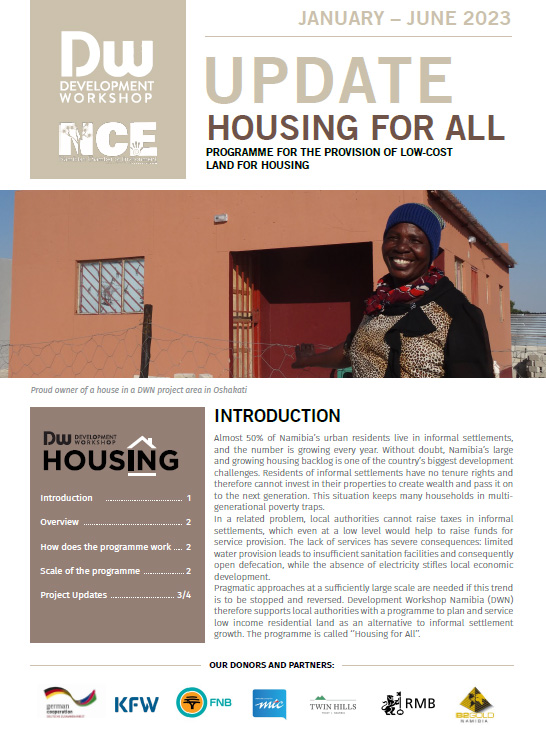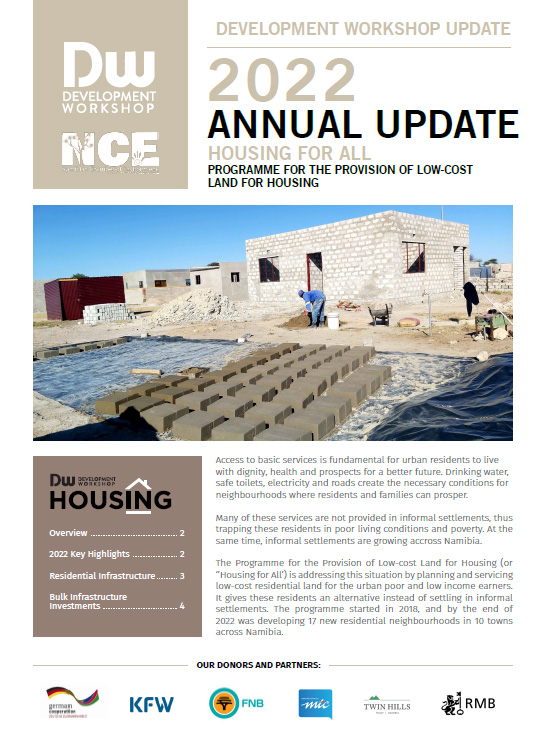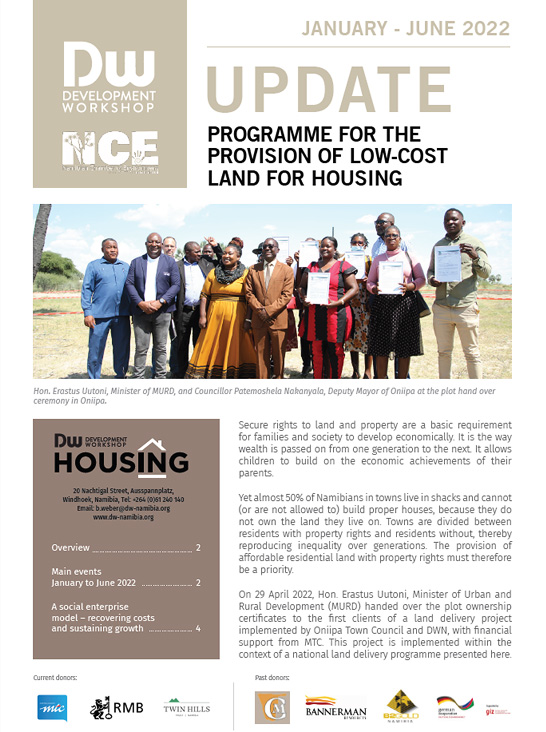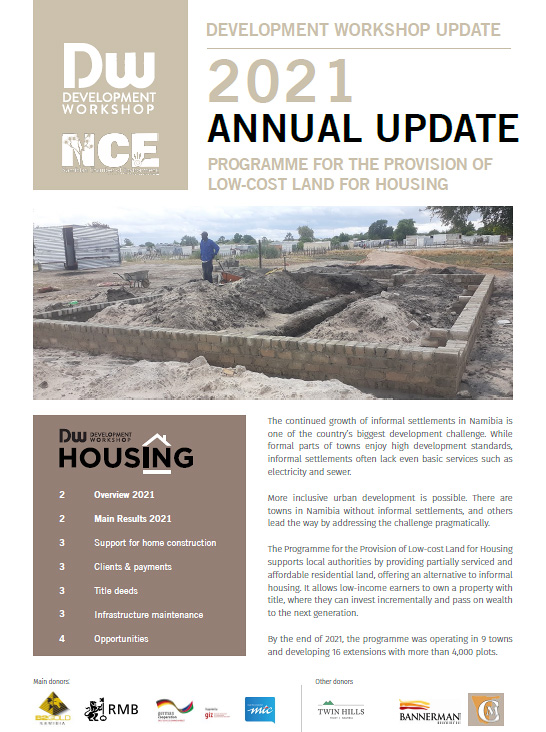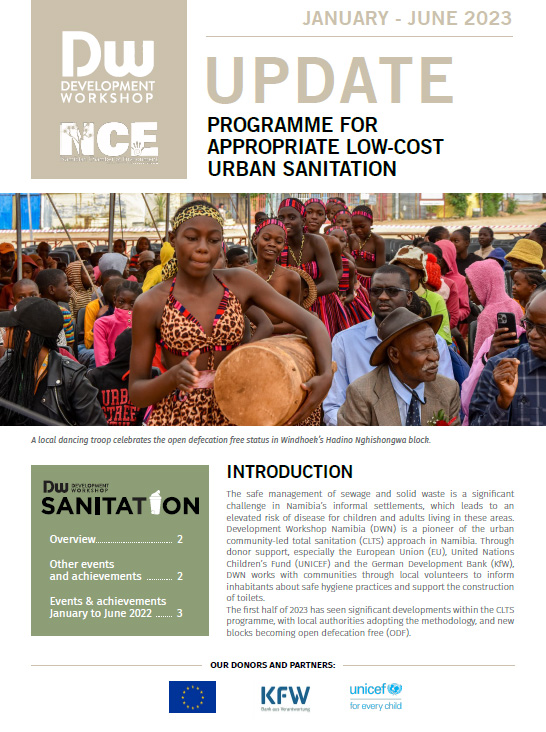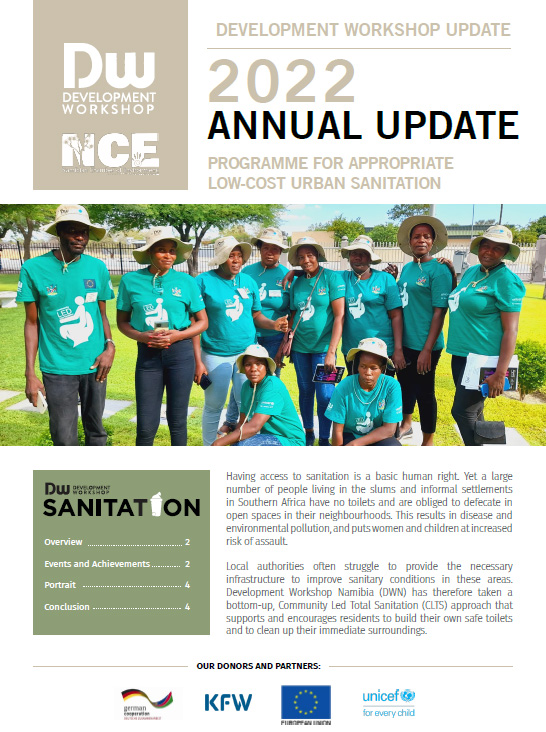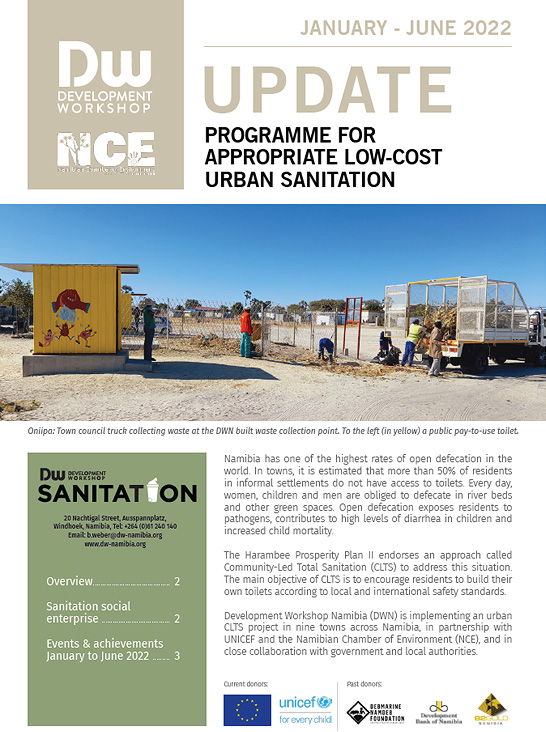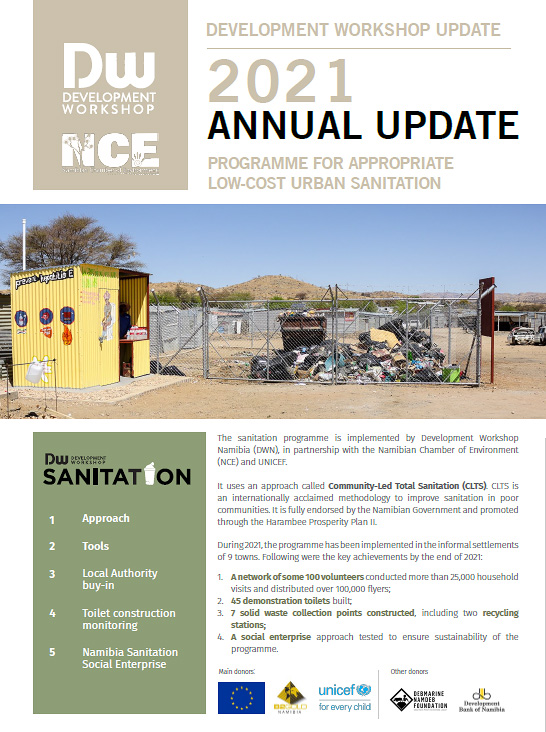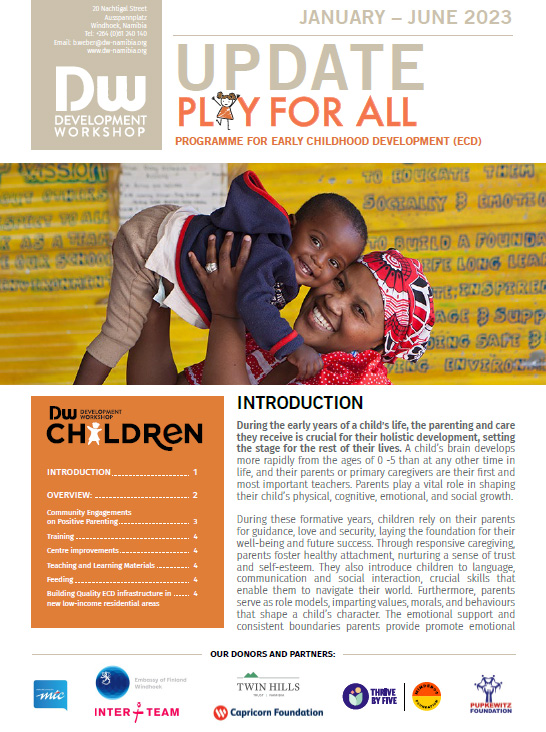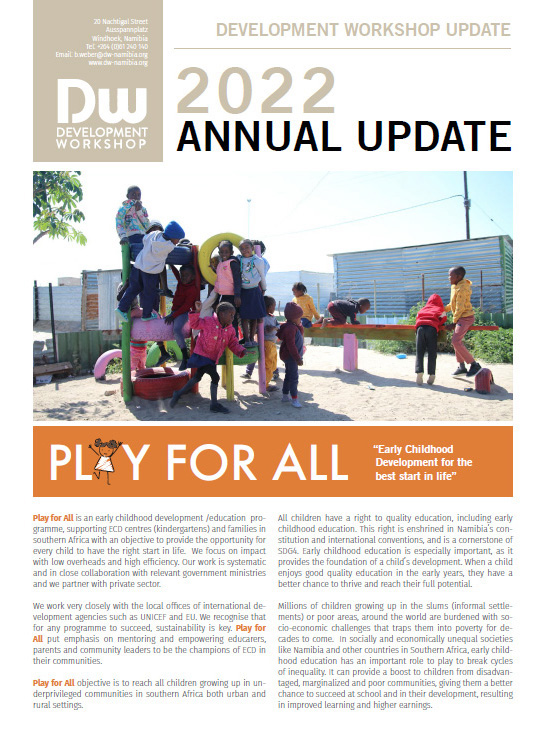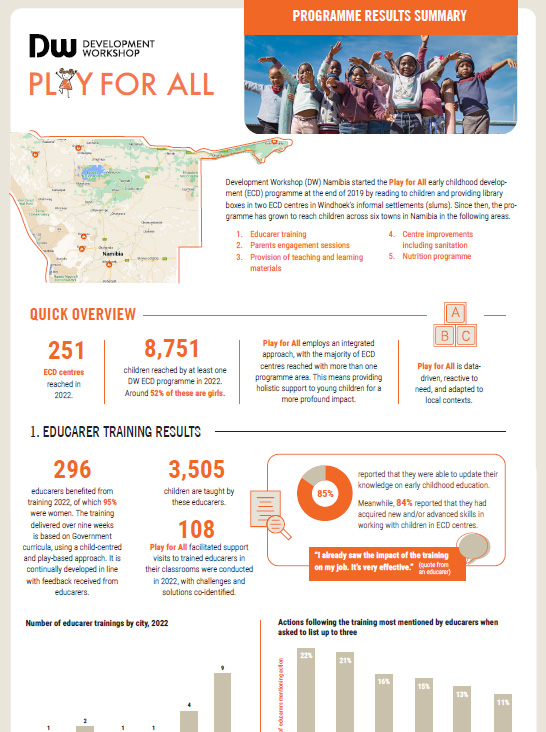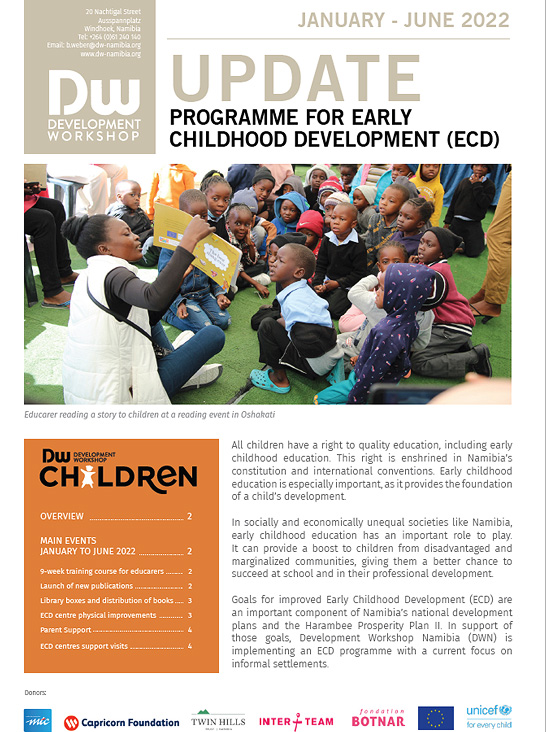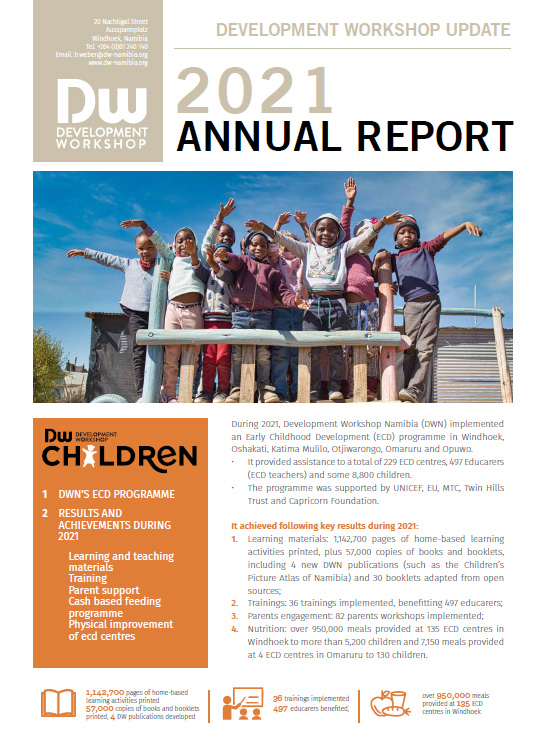The latest developments from the front lines of Development Workshop ’s work.
Land & Housing
2023 January to June
Housing for all
PROGRAMME FOR THE PROVISION OF LOW-COST LAND FOR HOUSING
Almost 50% of Namibia’s urban residents live in informal settlements, and the number is growing every year. Without doubt, Namibia’s large and growing housing backlog is one of the country’s biggest development challenges. Residents of informal settlements have no tenure rights and therefore cannot invest in their properties to create wealth and pass it on to the next generation. This situation keeps many households in multigenerational poverty traps.
2022 Annual Update
Housing for all
PROGRAMME FOR THE PROVISION OF LOW-COST LAND FOR HOUSING
Access to basic services is fundamental for urban residents to live with dignity, health and prospects for a better future. Drinking water, safe toilets, electricity and roads create the necessary conditions for neighbourhoods where residents and families can prosper.
2022 January to July
PROGRAMME FOR THE PROVISION OF LOW-COST LAND FOR HOUSING
Secure rights to land and property are a basic requirement for families and society to develop economically. It is the way wealth is passed on from one generation to the next. It allows children to build on the economic achievements of their parents.
2021 Annual Update
PROGRAMME FOR THE PROVISION OF LOW-COST LAND FOR HOUSING
The continued growth of informal settlements in Namibia is one of the country’s biggest development challenge. While formal parts of towns enjoy high development standards, informal settlements often lack even basic services such as electricity and sewer.
Sanitation
2023 January to June
PROGRAMME FOR APPROPRIATE LOW-COST URBAN SANITATION
The safe management of sewage and solid waste is a significant challenge in Namibia’s informal settlements, which leads to an elevated risk of disease for children and adults living in these areas. Development Workshop Namibia (DWN) is a pioneer of the urban community-led total sanitation (CLTS) approach in Namibia.
2022 Annual Update
PROGRAMME FOR APPROPRIATE LOW-COST URBAN SANITATION
Having access to sanitation is a basic human right. Yet a large number of people living in the slums and informal settlements in Southern Africa have no toilets and are obliged to defecate in open spaces in their neighbourhoods. This results in disease and environmental pollution, and puts women and children at increased risk of assault.
2022 January to July
PROGRAMME FOR APPROPRIATE LOW-COST URBAN SANITATION
Namibia has one of the highest rates of open defecation in the world. In towns, it is estimated that more than 50% of residents in informal settlements do not have access to toilets. Every day, women, children and men are obliged to defecate in river beds and other green spaces. Open defecation exposes residents to pathogens, contributes to high levels of diarrhea in children and increased child mortality.
2021 Annual Update
PROGRAMME FOR APPROPRIATE LOW-COST URBAN SANITATION
The sanitation programme is implemented by Development Workshop Namibia (DWN), in partnership with the Namibian Chamber of Environment (NCE) and UNICEF.
It uses an approach called Community-Led Total Sanitation (CLTS). CLTS is an internationally acclaimed methodology to improve sanitation in poor communities. It is fully endorsed by the Namibian Government and promoted through the Harambee Prosperity Plan II.
Early Childhood Development (ECD)
2023 January to June
PLAY FOR ALL
PROGRAMME FOR EARLY CHILDHOOD DEVELOPMENT (ECD)
During the early years of a child’s life, the parenting and care they receive is crucial for their holistic development, setting the stage for the rest of their lives. A child’s brain develops more rapidly from the ages of 0 -5 than at any other time in life, and their parents or primary caregivers are their first and most important teachers. Parents play a vital role in shaping their child’s physical, cognitive, emotional, and social growth.
2022 Annual Update
PLAY FOR ALL
“Early Childhood Development for the best start in life”
Play for All is an early childhood development /education programme, supporting ECD centres (kindergartens) and families in southern Africa with an objective to provide the opportunity for every child to have the right start in life.
Play for All
PROGRAMME RESULTS SUMMARY
Development Workshop (DW) Namibia started the Play for All early childhood development (ECD) programme at the end of 2019 by reading to children and providing library boxes in two ECD centres in Windhoek’s informal settlements (slums).
2022 January to July
PROGRAMME FOR EARLY CHILDHOOD DEVELOPMENT (ECD)
All children have a right to quality education, including early childhood education. This right is enshrined in Namibia’s constitution and international conventions. Early childhood education is especially important, as it provides the foundation of a child’s development.
2021 Annual Update
PROGRAMME FOR EARLY CHILDHOOD DEVELOPMENT (ECD)
During 2021, Development Workshop Namibia (DWN) implemented
an Early Childhood Development (ECD) programme in Windhoek,
Oshakati, Katima Mulilo, Otjiwarongo, Omaruru and Opuwo.
- It provided assistance to a total of 229 ECD centres, 497 Educarers (ECD teachers) and some 8,800 children.
- The programme was supported by UNICEF, EU, MTC, Twin Hills Trust and Capricorn Foundation.

